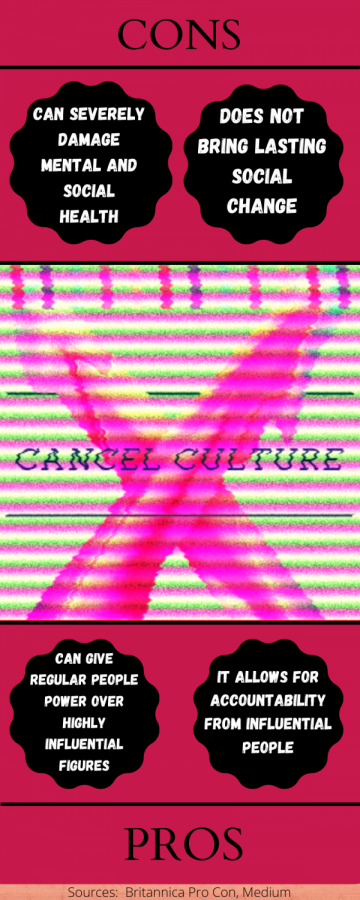Staff Editorial: Cancel culture does more harm than good
November 30, 2020
Although cancel culture has existed for many years, it became the center of attention for many when Tati Westbrook accused fellow beauty influencer, James Charles, of sexual harassment and bullying on her YouTube channel on May 10, 2019. As a result, Charles, at the peak of his career, lost over one million subscribers on his channel in a week. In a 41 minute video addressing the situation, Charles talked about how his mental health had been severely harmed by the hateful comments to the point where he even considered self-harm.
This is just one example of cancel culture in today’s society. The term refers to when groups shame someone, usually on social media, for doing or saying something offensive.
Generally, celebrities and other public figures are the ones getting canceled. Many claim that cancel culture is important because it gives regular people and historically marginalized groups the power to check public figures who influence certain topics such as racism, homophobia and the use of hate speech.
While holding public figures accountable for their actions is important, one video from one person doesn’t show all sides of the story. There is nothing that can protect people who haven’t made their case or presented their side of the story from getting hate and being attacked. Cancel culture focuses more on placing judgment on others rather than truly understanding the context or ambiguities of the situation.
Another example of toxic cancel culture occurred much more recently with Ellen DeGeneres losing much of her popularity as a result of accusations of her maintaining a toxic workplace. According to Vulture, she responded with a promise to “correct these issues” and apologized for any harm that may have resulted from her lack of presence in the workplace. However, as someone who “was judged and nearly lost everything” years ago when she came out as gay, she also acknowledged that the people who were “misrepresenting” her in this situation were causing far more harm by doing so.
DeGeneres being canceled with this intensity shows how some on social media will try to cancel people because it is trendy and cool, not because they care about the issue. This descended into a wave of hate and mass online bullying for DeGeneres.
“If all you’re doing is casting stones, you’re probably not going to get that far,” former President Barack Obama said at a youth activism summit. “That’s not bringing about change.”
People online use cancel culture as an ineffective way to force change without truly understanding the full extent of its impacts. The reality is that the true path to change is through learning from one’s mistakes. As long as cancel culture invalidates a person’s sincere apology to the audience they may have offended, any societal change coming from it will only be short-lived, but will have long term impacts on an individual’s mental health and personal life.


